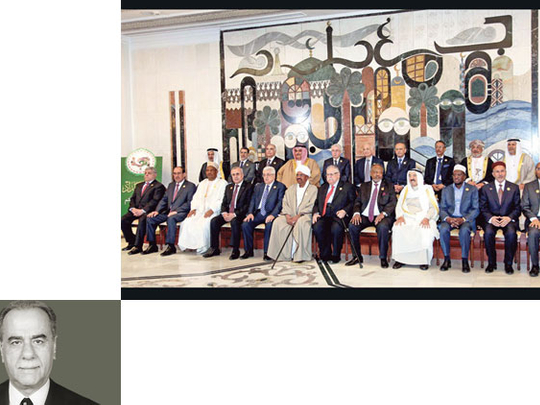
An important phenomenon has attracted the attention of Arab Spring observers — that these movements lack political leadership.
Most of those who discuss the revolutions in different media outlets are political analysts and media experts rather than the political leaders of the movement or official spokesmen. These revolutions have not had clearly defined leaderships.
In the mass participation in the revolts that swept Arab lands, we did not see the leaders of these revolts. The reason for this may be attributed to the ruling government's policies of systematically liquidating anyone who opposes the political status quo.
Past decades have witnessed government atrocities ranging from killings to imprisonment to exclusion of the opposition. All these cruel methods led some to give up their roles in the opposition, while others fled their countries and lived abroad in obscurity, which does not help create an active new leadership.
Those who chose to leave their countries were actually cut off from the common people and their problems; hence, they were unable to become real leaders of any revolt against despotic governments.
Having said that, it is important to understand that the systematic assassinations are not the only reason for the lack of leaders.
The other reason is that parties and traditional movements that enticed the hearts and souls of youth during the 1950s and 1960s — Arab nationalist, leftist and socialist parties — failed to understand the new age and were thus unable to develop agendas related to human rights. They were unsuccessful in keeping up with the times.
And despite the lack of leaders, we cannot overlook the fact that the revolutionaries were able to come up with a political, democratic, mature and enlightened vision. The slogans related to human rights, freedom, democracy, and living standard are all legitimate and no one can possibly oppose them.
People in Tunisia and Egypt succeeded in employing peaceful methods to bring about change; they did not resort to the use of violence, despite all that was done by the former regimes to provoke them to use violence.
The way the people handled the situation won them international sympathy, and the international community intervened to protect them and support them while criticising the governments that suppressed these revolts.
The absence of such leaders in fact contributed to making the crowds more harmonious, thereby helping them achieve their goals. The absence of these leaders was also good in that any disagreement which arose was not blown out of context and was resolved quickly as there were no clashing political agendas or ideologies promoted by political leaders. However, this advantage was soon lost after the fall of the regime. The new phase needs a new type of movement to resolve issues that are not best suited to be dealt with in public squares.
Moreover, the ability of the youth in using new media is no longer sufficient to write the more important chapters of their protests. In this context, the revolutions' tactical aspect has suffered.
Its role in drawing the features of the coming phase has also become more hazy because the masses that toppled their despotic regimes are comprised of city youth who lack political leadership skills and tactical know-how to organise and rally small towns and rural areas.
Fruits of revolution
The importance of rural areas, villages and small towns is due to their huge population and the increasing role they play in deciding the future of the country.
A number of political analysts and writers were disappointed with the results of the parliamentary elections in Egypt and Tunisia. Their once optimistic writings and analysis turned sour when they realised that those who harvested the revolution's fruits were not the same people who planted the seeds, and that the new emerging images of the state are not consistent with the dreams of young people who made the change possible.
In all truth, this is misplaced, considering that in a democracy everyone is equal. In a democracy — regardless of what you offer and what you do — everyone has one vote at the elections. In small towns and remote rural villages the atmosphere is very different from that in big cities.
The tempo of life is very slow in comparison to the big cities. Most people in rural communities uphold the conservative way of life which resists change.
There is also an instinctive tendency towards traditional religious references. Moreover, people in rural communities are accustomed to listening to sermons and edicts.
Such circumstances provide a fertile base for enhancing the influence of some political forces that belong to the past.
The Arab Spring harvest has revealed a paradox that is worthy of taking into account. It is a given in the Arab world that the country's capital is the place where decisions are made because it is the "head" or "centre". Whatever is seen fit in the capital is accepted elsewhere in the country.
The collapse of important establishments in any given Arab country was an indicator of the inevitable fall of the regime all over the country. However, the Arab Spring has shown us today that capitals are no longer the only place where the future of the country is decided.
Dr Mohammad Akef Jamal is an Iraqi writer based in Dubai.










